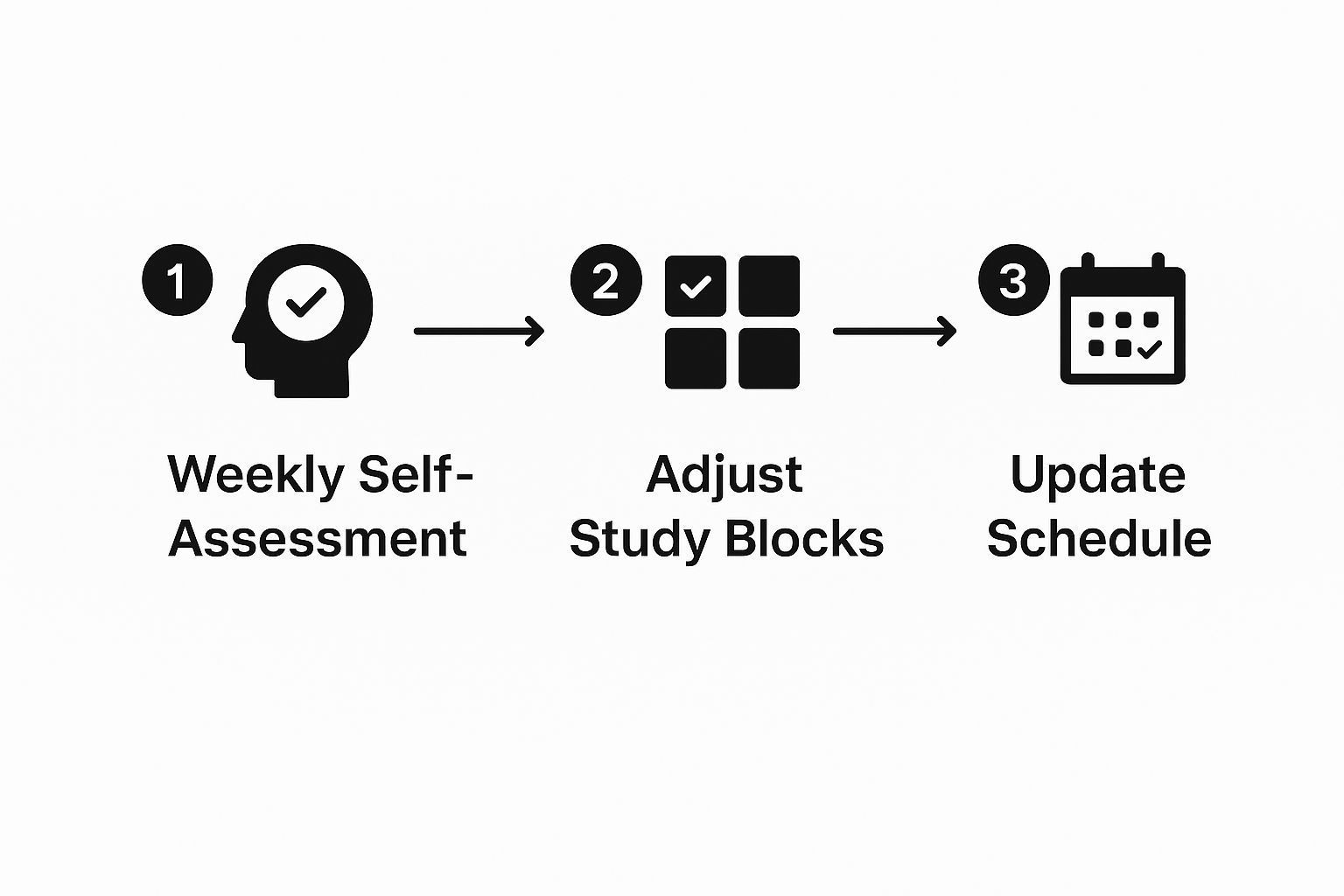A top-tier Step 2 CK study schedule is much more than a list of topics on a calendar. It’s your personal roadmap, built on an honest look at your starting point, a crystal-clear score goal, and a timeline that actually fits your life.
This isn't just about reviewing content; it's about methodically weaving together practice questions, content deep dives, and self-assessments over 4 to 8 weeks. This transforms what you learned in the clinic into a high-scoring performance on test day.
Building Your Foundation for Success
Before you even think about sketching out your first study day, you need to pour the concrete. A solid foundation for your Step 2 CK plan isn’t about picking a random date. It’s about a brutally honest, data-driven assessment of where you stand right now. This means looking past a single practice score and digging into the patterns of your performance.
Your past performance is the most reliable crystal ball you have. With Step 1 now pass/fail for most students, your pre-clinical and clinical grades carry even more weight. Research consistently shows that strong academic metrics, like an MCAT score over 510, correlate strongly with hitting a competitive Step 2 CK score above 255.
Even more telling is your performance on NBME shelf exams. Your scores, especially in Internal Medicine, have a powerful predictive link to your final Step 2 CK score. Some studies show a correlation coefficient as high as r = 0.752. This isn't just theory; it's a real-world indicator of your clinical knowledge base.
Assess Your Starting Point and Set Your Goal
Your first real step is to take a baseline exam. This could be an NBME Comprehensive Clinical Science Examination (CCSE) or a UWorld Self-Assessment (UWSA). Think of this as a diagnostic test, not a judgment. The score you get is your starting line.
- Analyze the Score Report: The three-digit number is just the beginning. Dive into the performance breakdown by subject and system. Are your weak spots glaringly obvious? Maybe you're crushing pediatrics but consistently fumbling cardiology questions. That’s valuable intel.
- Review Your Shelf Exam History: Pull up your third-year shelf exam scores. Do you see a pattern of honors-level performance? Great, you have a strong foundation. Or do you see a string of borderline passes? That signals areas needing some serious work.
- Define Your Target Score: "Doing well" isn't a goal; it's a wish. You need a number. What score does your dream specialty demand? Having a specific target is crucial. Before you get lost in the weeds of daily planning, it's vital to set goals effectively. A concrete number will anchor every decision you make, from which resources you use to how intensely you study.
Choose a Realistic Timeline
Once you know the gap between your baseline score and your target, you can pick a realistic study period. It’s so tempting to just copy what a classmate is doing, but that's a huge mistake. Your timeline has to account for your unique clinical foundation, personal commitments, and, most importantly, your mental stamina.
Key Insight: The single biggest mistake I see students make is picking an overly aggressive timeline that leads straight to burnout. An honest self-assessment now is your best defense against a failed study plan later.
To help you decide, think about where you fit in. Most dedicated study periods fall into one of these categories.
Choosing Your Dedicated Study Timeline
A comparison of common dedicated study periods to help you select the right timeline based on your clinical foundation and goals.
| Study Duration | Ideal Candidate Profile | Daily Study Intensity |
|---|---|---|
| 4 Weeks | Has a strong clinical foundation, consistently high shelf scores, and a small gap between baseline and goal. | Very High (Sprint) |
| 6 Weeks | Has a solid foundation but with 1-2 clear weak areas; needs a balanced approach for a thorough review. | High (Marathon Pace) |
| 8+ Weeks | Has a significant gap to their goal score, multiple weak subjects, or is studying alongside other commitments. | Moderate (Endurance) |
Choosing the right duration from the very beginning saves you from the panic of falling behind. If you have a 30-point gap to close and major weaknesses in core subjects like Internal Medicine and Surgery, a 4-week sprint is a recipe for disaster.
Be honest with yourself. Be strategic. Build the schedule that sets you up for success, not the one you think you should have.
Assembling Your High-Yield Study Toolkit

The market for Step 2 CK prep is crowded and expensive. It’s incredibly easy to fall into the trap of resource overload, buying every popular book and subscribing to every video service you hear about.
But here’s the secret: the goal isn't to accumulate resources. A successful Step 2 CK study schedule is built around a lean, powerful, and intentionally chosen toolkit. Think of it like a specialized toolkit for a complex surgery—you don't need every instrument ever made, just the right ones for the job ahead.
For most students, this boils down to a core triad of resources that work together seamlessly.
The Core Resource Triad
Time and again, the proven formula for success includes three key components. Each serves a distinct purpose, and together, they create a powerful learning loop that drives real progress.
- A Premier Question Bank: This is your non-negotiable cornerstone. There's a reason UWorld is the gold standard—its questions nail the exam's style and difficulty, and the explanations are a primary learning tool in themselves. Your goal should be to complete the entire Qbank at least once, and ideally, review all of your incorrects.
- A Concise Review Book: You need a high-yield text for quick reference and to tie everything together. A book like Step-Up to Medicine or Master the Boards is invaluable for reviewing a system before you dive into a block of questions. It provides the framework that helps the details from your Qbank actually stick.
- A Targeted Video Series: Videos are perfect for breaking down those notoriously tough topics or for hearing an explanation from a different angle. If you're struggling with complex physiology or management algorithms, resources like Boards and Beyond or OnlineMedEd can be lifesavers.
Matching Resources to Your Learning Style
This is where many students go wrong. Blindly copying someone else's resource list is a recipe for frustration. You have to be honest with yourself about how you actually learn best. This self-awareness is just as critical as the resources themselves.
Are you a visual learner? Then a video series should be a top priority. Do you learn by doing? Your focus should be almost entirely on maximizing your Qbank time, with a review book serving as a secondary reference. If you thrive on structure, that review book might form the backbone of your daily plan.
My Experience: I've seen countless students drown in resources. They spend more time deciding what to study than actually studying. A lean toolkit of one Qbank, one book, and one video series forces you to go deep rather than wide, which is exactly what this exam demands.
Integrating Your Tools for Active Learning
Just having the right tools isn't enough. It's how you integrate them into your daily Step 2 CK study schedule that truly drives results. Avoid passive learning at all costs. Don't just watch a video; take active notes and then immediately do a block of related questions to lock in that knowledge.
Here’s a practical way to structure your day:
- Morning: Kick things off with a 40-question, timed, random UWorld block to simulate real test conditions.
- Late Morning: This is where the magic happens. Dedicate 2-3 hours to a deep, thorough review of that block.
- Afternoon: Use your review book or videos to shore up weak areas you identified during your question review.
- Evening: Squeeze in a second, smaller question block, this time focused on the specific system you reviewed that afternoon.
Layering your resources this way creates a daily cycle of assessment, review, and reinforcement. It’s an active, integrated approach that separates the top scorers from everyone else. For more ideas on how to make your study sessions count, check out our guide on powerful medical exam study tips.
Designing Your Daily and Weekly Study Plan
Having the right tools is half the battle; actually using them is the other. This is where your strategy meets the pavement. Your daily and weekly plan for Step 2 CK is all about building a sustainable routine that pushes you hard but doesn't lead to a complete crash-and-burn scenario.
The structure of your day dictates your momentum. It’s the difference between focused, high-impact sessions and hours spent just staring at a screen, feeling that familiar dread creep in. A well-designed day is your best defense against the mental fatigue that plagues every student in their dedicated period.
Structuring Your Study Blocks
One of the first big decisions you'll make is how to tackle your question blocks: by system or completely at random? Honestly, there are strong arguments for both, and the best choice really depends on where you are in your prep and what you need to accomplish right now.
System-Based Blocks: Early on, this method is gold. Spending a day or two focused entirely on Cardiology, for example, lets you immerse yourself in the material. You start to connect the dots between pathophysiology and clinical presentation and see the common patterns in how they test certain concepts. This is fantastic for shoring up weak subjects.
Randomized, Timed Blocks: As you inch closer to test day, switching to random blocks becomes non-negotiable. This is what the real exam feels like—a rapid-fire switch from OB/GYN to surgery to pediatrics. It's the ultimate test of your knowledge retrieval and is crucial for building the mental stamina you'll need. It also exposes any lingering weak spots you didn't know you had.
A really common and effective approach is to spend the first half of your dedicated period on system-based review and the second half on random blocks. You get the best of both worlds: deep foundational learning followed by realistic test simulation.
Building Your Ideal Study Day
Let's be clear: there is no single "perfect" daily schedule. A successful one, however, always balances active learning with deep review and real rest. A punishing, back-to-back schedule simply isn't sustainable for weeks on end. You're aiming for a repeatable rhythm that leaves you feeling productive, not just depleted.
Key Takeaway: A productive study day isn't measured in hours logged but by the quality of your focus within those hours. Being realistic about breaks and review time is far more effective than planning a 14-hour marathon you can't actually stick to.
Think of this schedule as a starting point, a framework you can adapt. Maybe you’re a night owl, or maybe your focus tanks after 4 PM. Adjust the times to fit your personal energy levels. This is a guide, not a prison.
Sample Daily Schedule Template
| Time Slot | Activity | Purpose and Key Tips |
|---|---|---|
| 8:00 AM – 9:00 AM | UWorld Block 1 | Hit the ground running with 40 questions, timed. Treat it like the real deal—no phones, no interruptions. Your mind is fresh, so this is prime time to train your focus. |
| 9:00 AM – 12:00 PM | Deep Review | This is the most important part of your day. Period. Go through every single question, right or wrong. It should take 2-3x longer than doing the block itself. |
| 12:00 PM – 1:00 PM | Lunch & Break | Step away from medicine completely. Go for a walk, listen to music, eat a real meal. Your brain desperately needs this reset. |
| 1:00 PM – 3:00 PM | Content Focus | Target weak areas you found in your morning review. Use videos, your review book, or other resources to fill those knowledge gaps. Keep it active and targeted. |
| 3:00 PM – 4:00 PM | UWorld Block 2 | A second 40-question block. You could make this one system-specific to reinforce what you just reviewed in your content focus session. |
| 4:00 PM – 6:00 PM | Review Block 2 | Review this second block, focusing on cementing the concepts you just studied. This review might feel a bit faster than the morning one. |
| 6:00 PM – 7:00 PM | Anki/Light Review | Do your daily Anki reps. This is for maintenance and spaced repetition, not intense new learning. Keep it brief. |
| After 7:00 PM | Unwind | Seriously, stop studying. Your brain needs downtime to consolidate information. Exercise, hobbies, and rest are just as crucial for long-term retention as another question block. |
The Weekly Cadence
Your weekly plan should zoom out a bit. It incorporates this daily structure while also scheduling your larger milestones. Critically, plan for one lighter day or a half-day off each week. This isn't a luxury; it’s a strategic necessity to prevent burnout over a long dedicated period.
Finally, schedule your NBME practice exams or UWSAs on the same day each week, like every Saturday morning. This creates a consistent rhythm for tracking your progress and gets you into a predictable, test-taking mindset.
How to Actually Learn from Practice Questions

Finishing the UWorld Qbank is a classic Step 2 milestone, but let’s be honest—the score bump doesn't come from just checking boxes. It comes from mining every single question, correct or incorrect, for its educational gold. A truly superior Step 2 CK study schedule is built on a masterful review process that turns passive question-answering into active, high-yield learning.
This is where top scorers separate themselves from the pack. They don’t see a question as just another point to win or lose; they treat it like a case to be solved and a lesson to internalize. Moving beyond simply doing questions and mastering a system for reviewing them is the single most impactful change you can make to your prep.
Mastering the UWorld Review Process
Here’s the most common mistake I see: students will spend an hour on a 40-question block but only 30 minutes reviewing it. You need to flip this on its head. A proper, deep-dive review of a 40-question block should take you a minimum of two hours, and honestly, closer to three is even better.
This meticulous approach is how you squeeze every last drop of knowledge out of the Qbank. Here’s a system you can use to analyze each question and make sure you never make the same mistake twice.
For Every Incorrect Answer:
- Pinpoint the "Why": Get brutally honest. Why did you get it wrong? Was it a pure knowledge deficit? Did you misread the question stem or get lured in by a clever distractor? Identifying the root cause is the first step toward fixing it.
- Write Out the Core Concept: In your own words, jot down the one or two key learning points from the explanation. Don't just copy and paste. Forcing your brain to rephrase the information cements it on a much deeper level.
- Analyze All Answer Choices: Understand exactly why the correct answer was right and, just as importantly, why every other option was wrong. This is how you build killer differential diagnosis skills and start recognizing those subtle patterns on future questions.
For Every Correct Answer:
- Confirm Your Logic: Don't just celebrate and move on. Briefly review the explanation to make sure you got it right for the right reasons. It's surprisingly easy to guess correctly, and this quick check prevents you from building false confidence on a topic you don't truly own.
- Scan the Distractors: A quick look at why the other choices were wrong helps reinforce your knowledge and speeds up your recognition on exam day.
Expert Insight: I kept a simple spreadsheet to track my incorrects. It had columns for the question ID, the subject, and a short summary of the main learning point. This "mistake journal" became my single most valuable, personalized study guide in the final weeks before my exam.
Strategically Deploying Practice Exams
Think of your practice exams—the NBMEs and UWorld Self-Assessments (UWSAs)—as crucial progress checkpoints. Using them wisely is essential for tracking your growth and getting comfortable with the real test-day experience. Sprinkling them throughout your Step 2 CK study schedule gives you invaluable data to work with.
- Get a Baseline: Take one practice exam before your dedicated period starts to get an honest look at your starting point.
- Check In at the Midpoint: Schedule another exam about halfway through. This tells you if your study methods are working and helps identify any new weak areas that have popped up.
- Make Final Readiness Checks: In the last two weeks, use the UWSAs and the Free 120 questions to get a final score prediction and lock in your timing and pacing.
This structured approach to assessment provides critical data. In fact, performance data from the NBME highlights just how valuable these practice tests are. For instance, a high score on the Comprehensive Clinical Science Examination (CCSE) is a strong predictor of success—students have a 99% probability of passing Step 2 CK if they take the exam within one week of a strong CCSE performance. You can dig into the complete performance data from NBME to see these correlations for yourself.
Ultimately, the goal is to turn every single question and every practice test into a step forward. It’s a methodical process: diagnose a weakness, prescribe a learning remedy, and verify the cure. As you get better at this, you won't just see your practice scores climb; you'll build the deep clinical reasoning that this exam truly demands. For a more detailed breakdown of this whole process, you might find our complete guide on how to study for Step 2 CK helpful.
Adaptable Study Schedules for Different Timelines
It’s one thing to talk about study schedule theory, but seeing a plan in action is what really brings clarity. A great Step 2 CK study schedule isn’t a rigid prison; it's a flexible framework that should bend with your life and adapt as you figure out what's working and what isn't.
Below are a few sample schedules designed for the most common prep timelines. Think of these not as strict rules but as proven blueprints. They show how the core principles—system-based review, targeted question counts, and strategic practice exams—all come together. The real goal is to give you a solid starting point you can make your own.
This simple loop of planning, doing, assessing, and adjusting is the engine that will power your study period.

This cycle ensures you're always spending your precious time on what truly matters most for your score.
The 4-Week Sprint Schedule
A four-week dedicated period is an intense, all-out sprint. This timeline is really only for students who already have a strong clinical foundation from rotations and have a relatively small gap between their baseline score and their goal.
The focus here is on high-yield consolidation and aggressive question-solving, not learning foundational concepts from scratch.
Here's a bird's-eye view of how you might structure this intense month.
Sample 4-Week Dedicated Study Schedule
This table provides a high-level weekly overview for a condensed, 4-week dedicated study period.
| Week | Primary System Focus | Secondary System Focus | Key Milestone |
|---|---|---|---|
| Week 1 | Internal Medicine (Cardio, Pulm, Renal) | Biostats & Ethics | Baseline NBME/UWSA |
| Week 2 | Internal Medicine (GI, Endo, Heme/Onc) | Surgery | Midpoint NBME/UWSA |
| Week 3 | Pediatrics & OB/GYN | Neurology | UWorld incorrects review |
| Week 4 | Psychiatry & Remaining Subjects | High-Yield Review | Final UWSA & Free 120 |
In this model, you’re pushing for 100-120 questions daily. You'll likely start with system-focused blocks for the first couple of weeks to hammer down weak areas, then switch to purely random, timed blocks for the final two weeks to simulate the real exam. The key is relentless forward motion.
The 6-Week Balanced Marathon
A six-week schedule is a more balanced approach. It gives you enough time to really shore up one or two significant weak areas without the frantic, breakneck pace of a four-week plan. For many students, this is the sweet spot.
It's enough time to do more than just review but doesn't require a complete overhaul of your knowledge base.
You can follow a similar system-based progression, just with more breathing room.
- Weeks 1-3: Hit your biggest weak spots first. Dedicate 3-4 days per system, doing targeted UWorld blocks alongside deep content review. Aim for about 80 questions per day.
- Weeks 4-5: Now it's time to transition to mixed, random blocks. Ramp up your daily volume to 80-120 questions. This is where you build test-taking stamina and integrate knowledge across different specialties.
- Week 6: Time to taper down. Your focus should shift to reviewing your incorrects, your personal "mistake journal," and high-yield topics like biostats and ethics. Make sure to complete your final practice exams early in the week to give yourself time to review and rest.
My Experience: The six-week plan was perfect for me. It allowed me to dedicate a full three days to Cardiology—my personal kryptonite—without feeling like I was falling behind everywhere else. That extra day made a world of difference in my confidence and my score.
The 8-Week Deep Dive
An eight-week schedule is ideal for students who have a significant gap to close, multiple weak subjects, or are trying to study while juggling other commitments like research or family. This extended timeline allows for a truly deep dive into the material at a less punishing daily pace.
The structure is a bit different, allowing for a more methodical approach.
- First Four Weeks: Devote this time to building a rock-solid foundation. You might spend an entire week on a major system like Internal Medicine. Your daily question count will probably be lower, maybe around 40-60 questions, with more time dedicated to watching videos, reading, and making Anki cards.
- Second Four Weeks: This period should look a lot more like the 4-week sprint schedule. The focus shifts almost entirely to practice questions. You’ll ramp up your daily volume to 80-120 questions and use practice exams to track your (hopefully) rapid improvement.
No matter which timeline you choose, the core components are the same: assess where you're starting from, pick the right resources, and actively learn from every single question you do. These schedules are just the starting line—your real success will come from how you adapt them to fit your unique journey.
Your Final Two Weeks and Test Day Strategy

As you roll into the final stretch, the entire goal of your Step 2 CK study schedule needs to change. This isn't about cramming massive amounts of new information anymore. It's about consolidating what you know, building confidence, and strategically tapering your effort so you walk into the test center with a full tank, not running on fumes.
The last two weeks are purely for review. Trying to learn brand-new, complex topics now is a classic low-yield strategy that usually just ramps up your anxiety. Instead, your energy is best spent on high-yield, quick-hit topics that are easy to forget but are guaranteed points on the board.
Shifting to Final Review Mode
Those intense, 10-hour study days? They should be behind you now. Your study hours need to decrease, especially in the last few days before the exam. Your primary tools now are your personal notes, that "incorrects" journal from UWorld, and any rapid-review resources you trust.
A solid plan for this final phase could look something like this:
- Final Practice Exam: Take your last full-length practice exam (like a UWSA or the Free 120) about 7-10 days before your real test date. This gives you plenty of time to review it thoroughly without adding last-minute stress.
- High-Yield Drills: Dedicate time every day to the essentials: biostatistics, ethics, patient safety, and vaccination schedules. You're almost guaranteed to see these, and they are easy points if you know them cold.
- The Day Before the Test: Do absolutely no new questions. Seriously. A light, one or two-hour review of your notes or formulas in the morning is the absolute maximum. Your only job after that is to relax, pack your bag for test day, and get a great night's sleep.
Key Insight: Walking into the exam well-rested is infinitely more valuable than the handful of facts you might desperately cram the night before. You have to trust the months of hard work you’ve already put in.
Perfecting Your Test Day Logistics
The 9-hour exam is a marathon of mental endurance. Your plan for breaks and nutrition is just as critical as knowing the Krebs cycle. Don't overlook it.
Your Test Day Pack List:
- A valid, unexpired government-issued ID (check the name matches your permit!)
- Your scheduling permit (print a physical copy)
- Water and maybe a sports drink for electrolytes
- Easy-to-digest snacks like protein bars, nuts, or a banana
- Your preferred caffeine source, if that's part of your normal routine
- Any necessary medications, like pain relievers for a potential headache
When you get a break, the mission is simple: use the restroom, eat a small snack, and do a few quick stretches. Resist the powerful temptation to look up answers on your phone. Stay in your bubble and focus only on the next block.
Knowing what to expect can be a huge anxiety-reducer. The exam has seen a steady rise in both test-takers and passing rates. Between 2016 and 2023, the number of exams administered grew from roughly 38,000 to over 44,000 per year. During that same period, the overall pass rate improved from 88% to a reassuring 94%. With MD degree holders reaching pass rates as high as 98%, your dedicated preparation puts you in a very strong position.
Your performance on the NBME practice exams is one of the best predictors of your readiness. If you want to dig deeper into how to interpret those scores, we have a complete guide on using NBME practice exams for Step 2. By planning out this final phase as meticulously as you planned your study blocks, you give yourself the best possible shot to perform at your peak when it matters most.
Of course. Here is the rewritten section, designed to sound like it was written by an experienced human expert, following all your provided guidelines and examples.
Tackling Your Top Step 2 CK Scheduling Questions
Even with a perfect schedule on paper, the reality of Step 2 CK prep can spark new questions and a whole lot of anxiety. It’s completely normal. Let's walk through some of the most common concerns I hear from students as they build and execute their study plans.
How Long Should My Dedicated Period Be?
This is probably the number one question that keeps students up at night. Most people land somewhere between 4 and 6 weeks, but the honest answer is: it depends entirely on you.
If you felt strong in your clinical rotations and consistently did well on your shelf exams, a super-focused 4 weeks might be all you need. But if you know you have some weak spots, or you’re aiming for a top-tier score for a competitive specialty, giving yourself 6 or even 8 weeks is a smart move. It allows for a much deeper, less frantic review and can seriously lower your stress levels.
The only way to know for sure is to take a baseline practice test. That gap between your starting score and your goal score? That’s the single most important piece of data you have for picking a realistic timeline.
What Is The Best Way To Review Questions?
Your question review process is everything. I'm not exaggerating when I say it's the highest-yield activity in your entire Step 2 CK study schedule. Expect it to take 2-3 times longer than doing the actual block, but the payoff is absolutely worth it.
You need to review every single question, whether you got it right or wrong.
- For incorrects: Dig deep. What was the core concept you missed? Articulate that main learning point in your own words. I recommend keeping a running "mistake journal" or spreadsheet—this becomes your personal, high-yield study guide.
- For corrects: Don't just skip ahead. Quickly confirm why you got it right and, just as importantly, why the other answer choices were definitively wrong. This is critical for making sure you didn't just get lucky.
What Should I Do If I Fall Behind?
First, take a deep breath. It happens to almost everyone at some point. Falling behind is a signal to reassess your plan, not a reason to panic.
Be honest with yourself: why did you fall behind? Were your daily goals a bit too ambitious from the start? Or did life just throw you a curveball? Your priority is deep learning, not just ticking off boxes on a to-do list.
It is far better to trim a lower-priority task (like re-watching a video on a topic you're already strong in) to make sure you have enough time for your core UWorld blocks and that critical review period. Adjust your schedule to be more realistic instead of trying to cram everything in and burning out.
Feeling like you're drowning in the details of planning? A personalized schedule can change everything. The expert tutors at Ace Med Boards specialize in creating custom Step 2 CK study plans that fit your specific strengths, weaknesses, and score goals. Book a free consultation today to see how one-on-one guidance can help you succeed.

